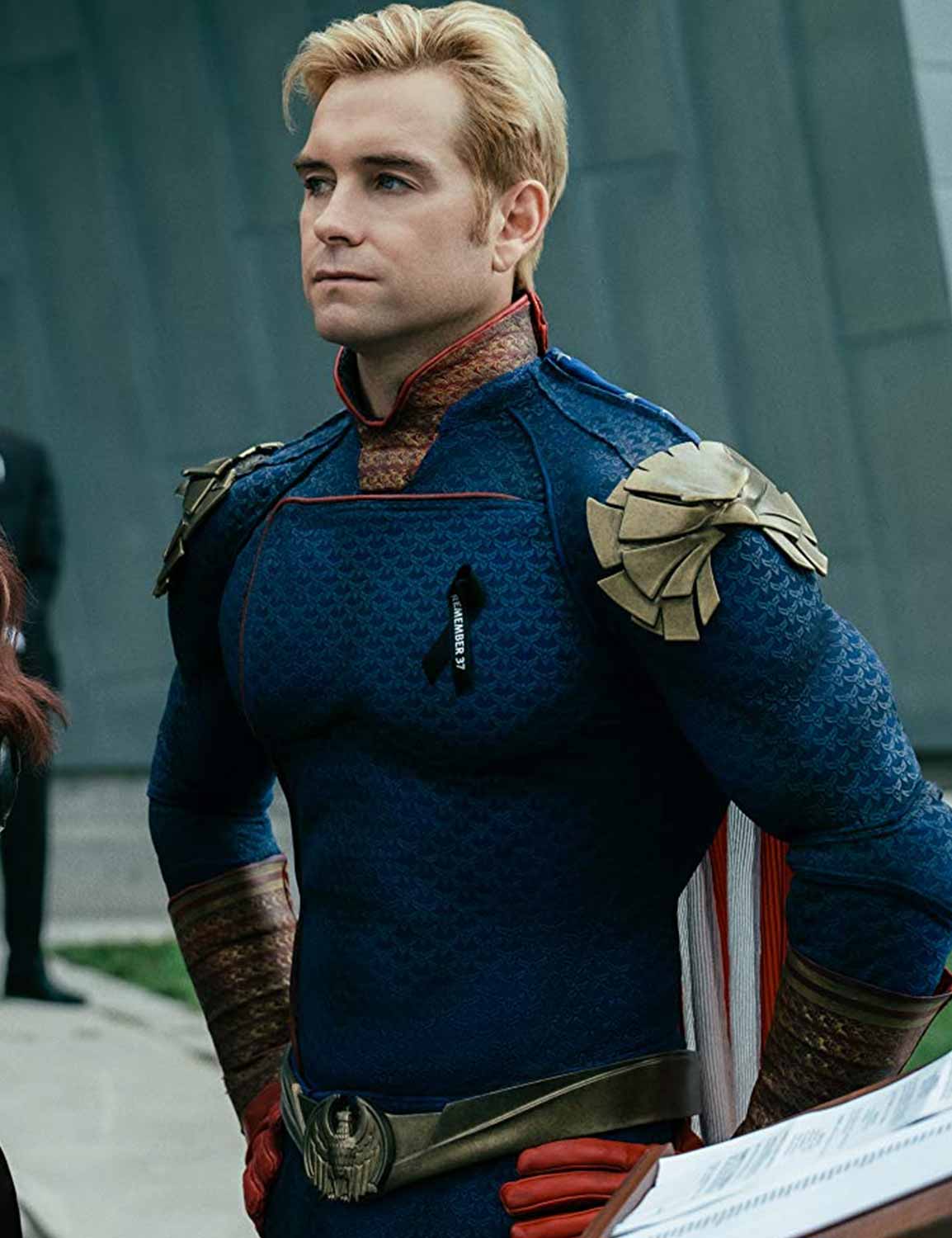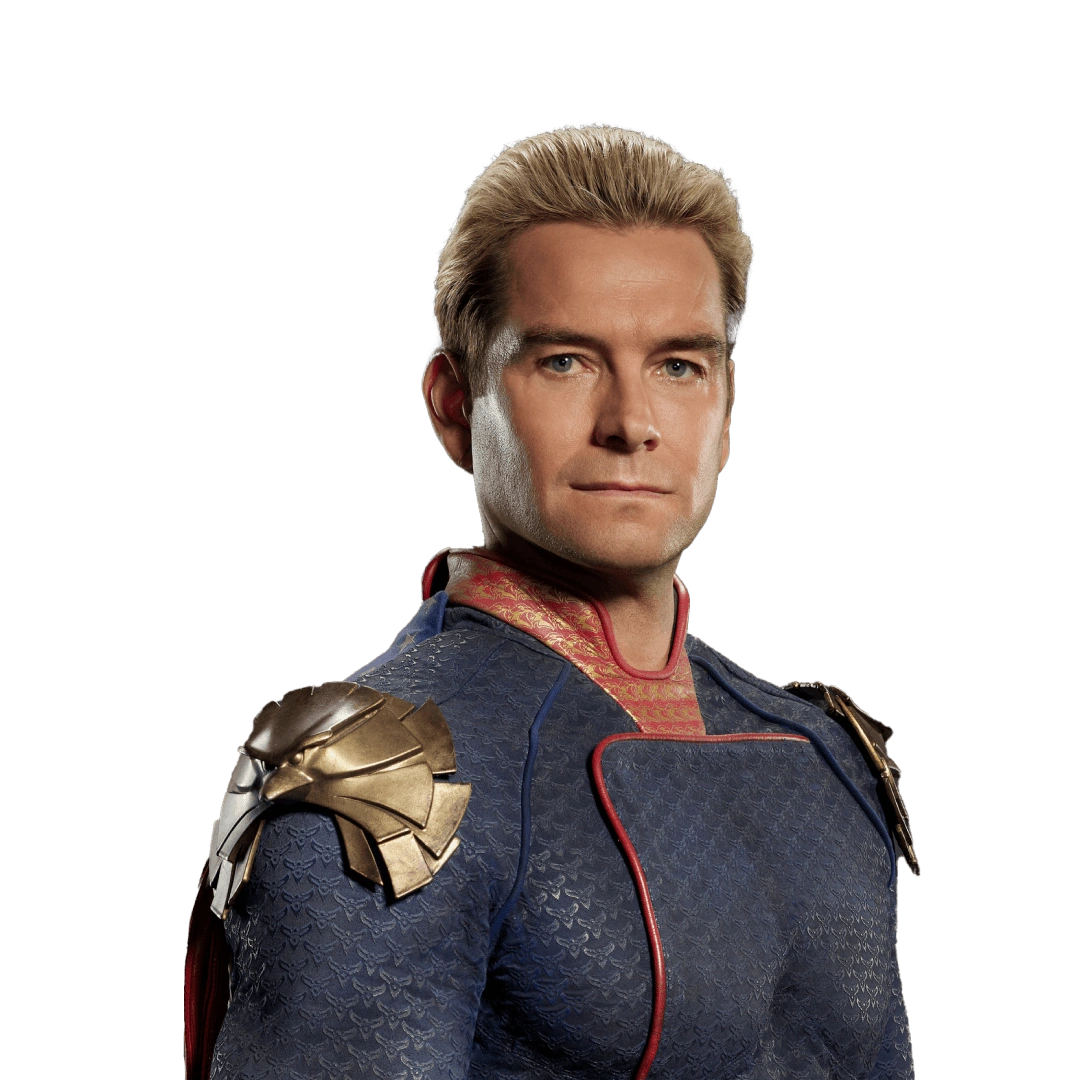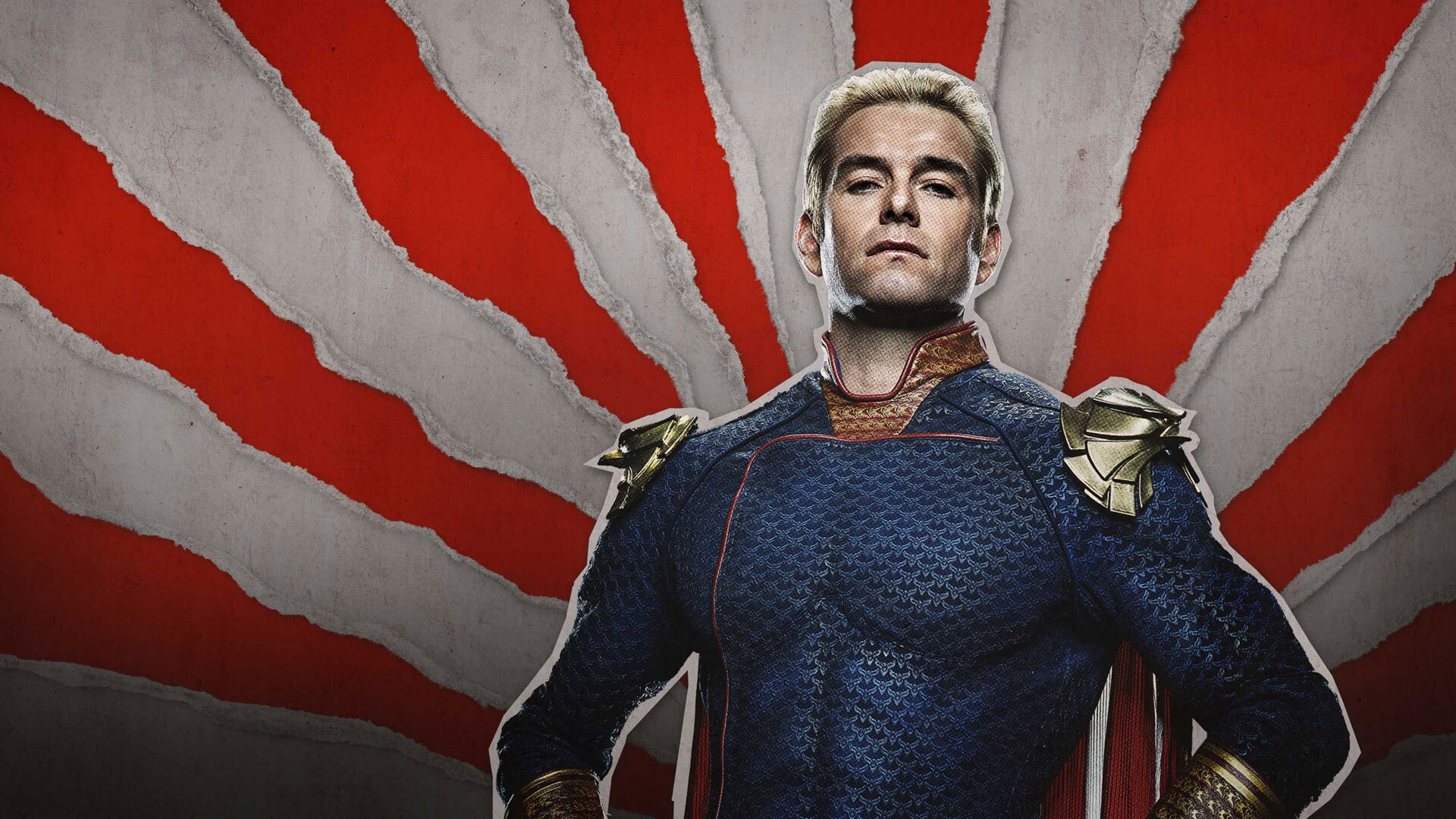Have you ever stopped to truly think about that look on Homelander's face? You know, the one where he seems utterly repulsed, almost like he's smelled something truly awful? That particular expression, Homelander looking disgusted, is more than just a fleeting emotion; it's a window into the very soul of the character. It tells us so much about what's really going on inside his head, beneath that polished, heroic exterior. It's a powerful visual cue, honestly, that reveals cracks in his seemingly perfect facade.
For someone who projects an image of ultimate control and supreme confidence, his moments of disgust are quite telling. They often appear when the world doesn't bend to his will, or when he encounters something that challenges his twisted view of how things should be. These brief glimpses of revulsion actually give us a deeper sense of who he is, beyond the capes and the laser eyes, suggesting a profound unhappiness that even his immense power can't fix.
This article will explore why Homelander so frequently appears disgusted, what those expressions signify for his character, and how these moments connect to his hidden vulnerabilities. We'll also consider what the showrunners are trying to communicate about power, public image, and the deeply flawed individuals who wield such immense strength. You know, it's pretty fascinating to break down.
Table of Contents
- Who is Homelander? A Profile
- The Face of Disillusionment: Why Homelander Looks Disgusted
- Homelander's Vulnerabilities: Beyond the Scowl
- Exploring the Limits of Strength
- Frequently Asked Questions
- Conclusion
Who is Homelander? A Profile
Homelander, the premier superhero of Vought International, presents himself as America's greatest protector. He's often seen soaring from sea to shining sea, looking for crime to stop and people to protect. Yet, his public persona hides a very, very dark truth. He is a deeply disturbed and narcissistic individual, driven by a desperate need for adoration and control. In fact, his actions often contradict the heroic image he so carefully crafts for the cameras.
He's a figure that, quite frankly, embodies the corrupting nature of absolute power. His public face is one of unwavering patriotism and moral rectitude, someone who pretends to be a Christian to get evangelicals to like him. However, behind closed doors, he is capable of unspeakable cruelty and petty vindictiveness. This stark contrast between who he pretends to be and who he truly is often fuels his private moments of profound unhappiness, you know?
Here's a quick look at some key aspects of this complex figure:
| Attribute | Detail |
|---|---|
| Public Role | America's premier superhero, leader of The Seven |
| True Nature | Narcissistic, sadistic, deeply insecure, overtly miserable |
| Key Motivation | To be unconditionally loved and admired |
| Political Persona | Right-wing populist, blames others (e.g., Biden for inflation) |
| Perceived Strength | Often believed to be invincible, capable of withstanding anything |
| Actual Strength | Not as strong as Vought claims; a nuke would likely kill him |
| Behavioral Tendencies | Schoolyard bully, picks on smaller, weaker individuals |
The Face of Disillusionment: Why Homelander Looks Disgusted
The image of Homelander looking disgusted is far from accidental. It's a deliberate choice by the show's creators to peel back the layers of his character. These expressions often surface when his carefully constructed world starts to fray, or when he's confronted with realities he simply can't control or manipulate. It's a visual shorthand for his internal turmoil, you know, a sign that his perfect world is crumbling.
This disgust isn't just a simple dislike; it's a profound revulsion, often directed at perceived weakness, defiance, or anything that reminds him of his own hidden limitations. He expects the world to cater to his every whim, and when it doesn't, that look of utter contempt is what we get. It's a very visceral reaction, actually.
A Bully Exposed
One of the clearest reasons for Homelander looking disgusted comes from his core nature as a bully. He's the equivalent of a school yard bully who picks on smaller, weaker, younger kids that eventually gets his butt kicked by someone’s older sibling. When confronted with genuine strength, defiance, or even just a lack of fear from those he expects to dominate, his disgust can really show itself. He can't stand it when his intimidation tactics don't work, so.
His disgust often arises when his victims don't cower as expected, or when someone stands up to him. This challenges his worldview, where he is the absolute apex predator, and everyone else is beneath him. It's a sign of his own insecurity, masked by an outward display of contempt. He hates anything that reminds him he's not truly all-powerful, you see.
The Illusion of Invincibility
Another major trigger for Homelander looking disgusted is the shattering of his own perceived invincibility. Homelander is definitely not as strong as they say, and it would make sense for them to invent the story of him taking a nuke to the face with no damage, to trick the other supes into believing he's unstoppable. When the reality of his limitations creeps in, or when someone dares to suggest he isn't truly indestructible, his face often contorts in pure revulsion. This is because he has built his entire identity around this myth of being untouchable, so.
Furthermore, Stillwell confirms that a nuke would kill him, but dismisses the strategy because it would bring too much negative attention to Vought. This knowledge, that he *can* be harmed, is something he desperately tries to suppress, and any reminder of it likely fuels his deep-seated disgust. He wants to believe his own hype, you know, and any challenge to that is a personal affront.
Political Theater and Personal Revulsion
Homelander is supposed to be a right wing populist and someone who pretends to be a Christian to get evangelicals to like him. His public image is carefully crafted, and any deviation from this perfect narrative can cause him immense internal distress, which often manifests as disgust. When the world doesn't align with his fabricated reality, or when people don't buy into his carefully constructed lies, he gets that look. It's almost as if he's disgusted by the sheer audacity of reality not conforming to his performance, you know?
He blames Bidens just someone who you blame for inflation, projecting his own failures and frustrations onto convenient scapegoats. When this strategy doesn't work perfectly, or when he feels his control over public opinion slipping, that profound sense of disgust can really take hold. It's a very clear sign of his inability to cope with anything less than absolute adoration.
The Thirst for Unconditional Love
Perhaps the most poignant reason for Homelander looking disgusted is his primary motivation: to be unconditionally loved. The homelander is overtly miserable even when being feared or attended to despite his sadistic tendencies. He craves genuine affection, but his methods of obtaining it—through fear, manipulation, and forced adoration—always fall short. When he sees real human connection, or when he realizes the emptiness of his own relationships, that disgust can be aimed inward, a reflection of his own deep unhappiness. It's a pretty sad state of affairs, really.
This constant yearning for something he can't truly earn or experience, combined with his inability to form healthy bonds, leaves him perpetually dissatisfied. The disgust he displays is, in many ways, a manifestation of his profound loneliness and the bitter taste of his own unfulfilled desires. He's always chasing something just out of reach, and that's incredibly frustrating for him, obviously.
Homelander's Vulnerabilities: Beyond the Scowl
The moments when Homelander looks disgusted are not just fleeting expressions; they are crucial indicators of his deeper vulnerabilities. They show us that despite his incredible powers, he is far from invulnerable emotionally. A lot of people who are now declaring the show to be too woke likely didn't understand that Homelander's character has always been a critique of certain societal elements, and his vulnerabilities are part of that message. These emotional cracks are arguably his biggest weakness, actually.
His need for validation, his deep-seated insecurities, and his inability to truly connect with others are all laid bare in these moments of profound revulsion. He's a character built on a foundation of lies and fear, and any threat to that foundation, no matter how small, can trigger a visible reaction of disgust. It's a very telling sign of his fragile ego.
Exploring the Limits of Strength
The show consistently plays with the idea of Homelander's limits, and his disgusted expressions often tie into this theme. Three seasons in and we still don’t really know the limits of Homelander’s durability and if/how it’s possible to kill him using… anything. This uncertainty keeps viewers on edge, but also fuels Homelander's own paranoia. His disgust can arise from the sheer frustration of not being truly invincible, or from the fear that someone might eventually find his weakness. It's a constant worry for him, apparently.
While some might lowball Homelander, suggesting he'd be about B tier if he was in Marvel or DC, the show makes it clear that he's a force to be reckoned with, but not without his limits. Even if both are equal in strength, his emotional instability often puts him at a disadvantage. Stardust platinum can likely react to Homelander just fine, but i'm not sure he can block eye lasers. Dunno this one is weird, i'd say Stardust Platinum can beat Homelander pretty convincingly in a straight fight, which again, highlights that he's not completely unstoppable. His disgust, then, is often a reaction to the terrifying possibility of encountering a true equal or superior.
Now that the show is bashing certain ideas, it's clear that Homelander's character arc is designed to explore the consequences of unchecked power and the deep psychological scars that come with it. His disgusted expressions are just one of many ways the show communicates his internal decay. They are a constant reminder that even the most powerful individuals can be utterly miserable, you know, despite all their outward might.
Frequently Asked Questions
Here are some common questions people have about Homelander's character and his behavior:
Why does Homelander often seem unhappy?
Homelander is overtly miserable even when being feared or attended to despite his sadistic tendencies. His unhappiness stems from a deep-seated need for unconditional love that he can never truly attain, combined with the constant pressure of maintaining a perfect public image while harboring immense power and insecurity. He's always chasing something that isn't real, so.
What does Homelander's disgust reveal about him?
Homelander looking disgusted reveals his profound narcissism, his inability to tolerate anything less than absolute control, and his deep-seated insecurities about his own strength and vulnerability. It's often a reaction to perceived weakness in others, or a reflection of his own internal turmoil and dissatisfaction with a world that doesn't bend to his will. It's a very telling sign of his inner state, actually.
Is Homelander truly as strong as he appears?
Homelander is definitely not as strong as they say, and the story of him taking a nuke to the face with no damage was invented to trick other supes. Stillwell confirms a nuke would kill him. While incredibly powerful, his limits are still largely unknown, and his emotional instability often makes him vulnerable in ways that sheer physical strength cannot overcome. He's strong, but not invincible, you know?
Conclusion
The moments of Homelander looking disgusted are much more than simple facial expressions; they are crucial narrative devices that peel back the layers of a truly complex and troubled character. These looks of revulsion highlight his deep unhappiness, his hidden vulnerabilities, and the constant struggle between his public facade and his private misery. They remind us that even someone with immense power can be profoundly dissatisfied. You can learn more about character analysis on our site, and perhaps link to this page for more insights into the show's characters.
By paying attention to these subtle, yet powerful, visual cues, we gain a richer understanding of Homelander's motivations and the show's broader commentary on celebrity, power, and the human condition. It's a pretty fascinating study, to be honest. For more details on the show's overarching themes, you might want to check out the official The Boys series page.



